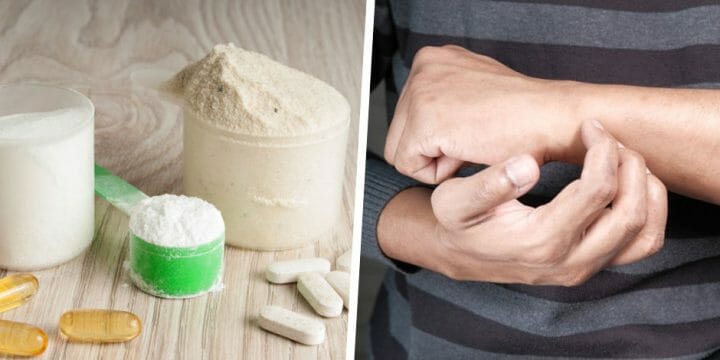If you tried every diet plan and exercise regimen known to man but still can’t lose weight or find it hard to stop eating, the leptin resistance might cause the trouble.
Weight gain could be a symptom caused by a loss of hormonal balance in your body and not just a lack of willpower to shed pounds.
So, I researched and dug into journals and studies to find out more about what leptin resistance is, and here's everything you need to know.
Quick Summary
- Leptin resistance is a condition where the brain doesn't properly recognize leptin signals, affecting fat storage and food intake, leading to constant hunger and weight gain.
- Key symptoms include persistent hunger, difficulty losing weight, and high inflammation levels, with causes like high leptin levels, inflammation, and free fatty acids.
- Research published in PubMed highlights the link between leptin resistance and unhealthy lifestyle habits, particularly poor sleep, underscoring the importance of sleep quality in hormonal balance and weight management.
- From my perspective, addressing leptin resistance is crucial, not only for weight management but also for overall well-being, emphasizing a holistic approach to health that includes diet, exercise, and lifestyle changes.
Leptin Levels and Leptin Resistance

Leptin is often called the “satiety hormone” – a hormone secreted from fat cells that helps you feel full.
The hormone leptin acts as a signal to the brain to regulate fat stores, energy expenditure, and food intake. Here’s how:
- When fat cells decrease, leptin levels fall to stimulate your appetite until the body gains the right amount of body fat.
- When fat cells increase, leptin levels rise to suppress your appetite until the body loses weight.
Leptin works together with other hormones such as ghrelin, the hunger hormone, to control when you eat and how much you eat.
Leptin resistance occurs when the brain fails to respond to leptin, a hormone that regulates hunger and body weight. Despite high leptin levels, the brain perceives starvation, leading to increased eating and weight gain.
From my coaching experience, I've seen leptin resistance firsthand, where clients struggle with hunger and weight gain despite high leptin levels, as their brains don’t properly respond to this crucial hormone.
Additionally, leptin deficiency, a rare but severe condition, involves no leptin production, causing excessive eating, obesity from a young age, and possibly impacting the immune system and puberty timing.
Weight loss efforts are often complicated by leptin resistance; after losing weight, leptin levels decrease rather than reversing the resistance, resulting in heightened hunger and reduced weight loss motivation.
Beyond weight management, leptin plays a significant role in regulating metabolism, endocrine functions, and immune responses, highlighting its importance in overall health and well-being.
What Are the Symptoms of Leptin Resistance?

Here are some symptoms of this medical condition:
- Constantly feeling hungry
- Struggling to drop pounds
- Being overweight
- High levels of leptin
- High inflammation levels
What Causes Leptin Resistance?

No research has figured out the exact cause of this condition, but many factors can be at play.
In my years as a coach, I've observed that factors like high leptin levels, inflammation, and free fatty acids often contribute to leptin resistance in my clients.
High levels of leptin
When there’s more leptin than your body normally has, it causes you to be resistant to leptin over time.
Overeating and obesity, the symptoms of this condition, can result in more leptin, too. The more you eat, the more fat you intake, the higher the leptin amount.
It becomes a vicious cycle.
Inflammation
Research published in Current Immunology Reviews says that leptin triggers the production of inflammation-promoting substances from the fat cells, in turn evoking more leptin production [1].
So, inflammation can be a cause and a symptom at the same time. More leptin released may lead to becoming leptin resistant.
Free fatty acids
High amounts of triglycerides, a type of body fat, seem to interfere with leptin signaling the brain, triggering increased leptin production.
Leptin Resistance Diet and Treatment

There are ways to increase leptin sensitivity through diet and certain lifestyle habits.
Based on my experience coaching clients with leptin resistance, I recommend a diet rich in lean protein and soluble fiber and advise against completely cutting out carbs.
Leptin Resistance Diet
Here are the leptin diet ground rules:
- Consume more lean protein and soluble fiber.
- Reduce carbs in your diet but do not eliminate them completely.
- Eat only three meals a day and avoid snacking between meals and before bedtime.
- Cut back sugar, artificial sweeteners, and soda; instead, consume a balanced diet of vegetables, fruits, protein sources, and healthy fats.
Foods To Eat When You’re Leptin Resistant

Fill your plate with the proper nutrition for LR:
- Low-fat proteins: Fish, Poultry, Beans, Soy
- Whole-grains
- Non-starchy vegetables: Broccoli, Kale, Cauliflower
- Fiber-rich foods: Oats, Peas, Beans, Apples, Citrus fruits
Healthy lifestyle habits
Research published in PubMed also found that leptin resistance is tied to unhealthy habits, such as poor sleep [2].
In my coaching practice, improving sleep has been a game-changer for clients dealing with leptin resistance, underscoring the connection between quality rest and hormonal balance.
So, try to do more of these healthy lifestyle habits:
- Get more sleep.
- Reduce your stress by spending time with your friends, preferably outdoors - in nature, or reading an interesting book.
- Exercise regularly especially high-intensity workouts and weight lifting.
- Detoxify your life by avoiding processed and artificial foods and switching to natural products.=
Other factors may also have a positive impact on leptin sensitivity, like reducing insulin resistance (a hormone that lowers blood sugar levels) and decreasing triglycerides, a type of blood fat.
“Insulin resistance creates leptin resistance. So, lower your insulin levels by consuming less sugar – it could be the answer to improve insulin resistance and aid weight loss.”
– Robert H. Lustig, MD, Professor of Pediatrics at the University of California San Francisco
It’s also recommended to talk to your healthcare provider to test the leptin in your blood and get a diagnosis and support for leptin resistance.
FAQs
Is There Medication for Leptin Sensitivity?
A study suggests that metformin, a medicine for treating diabetes, may help treat leptin resistance and increase leptin sensitivity [3]. However, it’s best to contact your doctor before taking any medication.
What Foods Should I Avoid With Leptin Resistance?
Cut back added sugars, refined grains, processed foods, regular and diet soda, fats, and oils from butter, margarine, or palm oil to aid leptin functioning.
Is There a Supplement for Leptin?
Leptin cannot be taken as a supplement because it is a digestible protein and does not enter the bloodstream; however, these called leptin supplements on the market have ingredients that may help balance hormones and increase feelings of fullness.
References:
- https://www.ncbi.nlm.nih.gov/pmc/articles/PMC2829991/
- https://pubmed.ncbi.nlm.nih.gov/15531540/
About The Author
You May Also Like






